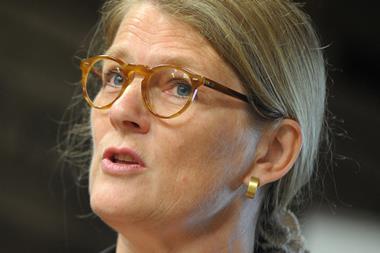As Christine Tacon announces she will step down as GCA, will her ‘light-touch’ plan work? And who, if anyone, will replace her?
The future of the Groceries Code Adjudicator is at a crossroads. After six years in the role, in which most observers agree she has helped transform retailer behaviour, Christine Tacon this week announced she would step down next June.
With pressure once again from politicians for the Adjudicator’s remit to be altered, Tacon’s confirmation that she would not extend her contract looked pointed - and she admitted they might struggle to find anyone willing to replace her if the brief is widened in the way MPs seem to think it should be.
But it was Tacon’s controversial suggestion that retailers might police their own governance of the code that got tongues wagging most.
So what are her plans for retailer self-regulation and what do suppliers think? After two formal investigations (Tesco, Co-op) and hauling other retailers (Asda, Morrisons) over the coals for their behaviour, Tacon looks likely to bow out without ever using the fining powers she pressed for.
However, the Adjudicator plans to use the Co-op investigation (in March she found the retailer guilty of breaches of the code, including not giving enough notice to suppliers about delistings) as a model for a new light-touch regulatory system, with retailers getting new powers to police their own governance of GSCOP.
Tacon argues the huge improvement in retailer behaviour since she took up the role six years ago means she no longer needs to pursue her previous policy of having a list of key issues on her agenda.
“This is the best way to make sure breaches of the code don’t happen, and if they do, that they are quickly picked up and put right,” Tacon says. “It means retailers doing the right thing not only because it is required of them, but because it makes good business sense.
“If you speak to suppliers they will always say ‘don’t take the policeman away’. But I want to leave having made sure we have governance systems embedded in retailers to ensure these things don’t happen again.”
Many suppliers are not reassured. “I had an email from one supplier as soon as this was announced,” says Ged Futter, who runs code training experts GSCOP Ltd. “He said what’s being proposed would be a disaster for the industry and it sums up what suppliers will be thinking. I can’t believe for a second that any of my clients will be happy for a return to self-regulation.”
British Brands Group director John Noble also has doubts. “A successful culture of self-regulation exists in a number of fields, but only where there is effective monitoring and review, along with credible sanctions when things go wrong,” he says.
‘Supplier apathy’ could lead to disappearance of Grocery Code Adjudicator role says Christine Tacon
Are retailers as squeaky clean as the Adjudicator claims? YouGov data suggests “continuing improvements” in retailer behaviour, says Tacon.
However, aside from two ongoing probes into disputes over delay in payments by as-yet unnamed retailers, some believe positive spin masks ongoing problems.
Futter points out that even Aldi - top of the league table for behaviour for the sixth year in a row - only scored 55% for applying the code “consistently well”. No other retailer managed over 50%.
And while Tacon argues other examples are a blip, such as the fall in the perceived behaviour of Tesco after complaints from suppliers about its Booker operations, there are holes aplenty.
With 44% of respondents saying they had received no training in the code, and 9% saying they didn’t know whether they had or not, there remain serious questions over how equipped suppliers are in code awareness.
Meanwhile the “climate of fear” is getting worse, with 53% of suppliers saying they would not report a suspected code breach for fear of repercussions, compared with 47% last year.
“In the past six months I’ve had more dispute resolutions with my clients than in the previous two years,” says Futter. “The fact is retailers have shown themselves blatantly not deserving of self-regulation.”
“I continue to feel that retailers ‘talk’ the code but continue to try every means possible to get around it in what they actually do,” adds one supplier.
What could Tacon’s replacement do? Some suppliers fear a less empowered Adjudicator who is also more of an administrator than Tacon, will let retailers slip back to old ways.
“I have always said that if they had given a retired judge the job they would have sat around twiddling their thumbs,” notes Tacon herself.
But it is just as possible, notes one supplier source, that “given what the BEIS Committee has been saying, we might also get someone come in and swing the big stick”.
Mark Jones, partner at law firm Gordons, thinks the individual approach of the next GCA will be more important than the power they inherit.
“Tacon has always tried to collaborate with the retailers,” he says. “Where there is a problem, as the Co-op investigation report confirms, her starting point was to ask the retailer to ‘sort it out’ before she took action. That approach is a personal choice. The next GCA may take the view that if a problem arises, and the evidence is there, investigations will follow and so will fines.”
Another source said the future of the role could also be confused by an array of other regulation from the EU and the UK. “The government really needs to look at what its policy wants to achieve,” the source said. “The government is planning an Agriculture Bill which will bring elements of the code to primary producers but it doesn’t mean GSCOP will cover the whole chain.
“Then there is the extent to which we may be required to comply with the EU directive on unfair trading practices to trade with the EU. There is also the voluntary prompt payment system which was the nub of BEIS’ criticism and the reason for their obsession with payment terms rather than late payment.”
And then there’s Brexit, meaning it could take years for a coherent strategy to emerge, some fear, especially as a wholesale change to the GCA remit will require more regulation.
Christine Tacon’s exit announcement will surely make suppliers nervous
How significant is it that Tacon is leaving after a bust-up with MPs? Confirmation that Tacon is leaving the role was no shock, just as it won’t be to see her land a big role elsewhere next summer.
But Tacon did little to conceal her anger with a grilling she received last month from MPs on the Business, Energy and Industry Strategy Committee, which even hardened retail bosses admitted they found hard to watch. Despite being hailed as a “model” of modern-day regulation by ministers, in a long-delayed government review in July 2017 that concluding there had been widespread improvement in the behaviour of supermarkets under her watch, last month Tacon was accused of being inflexible and unwilling to consider broadening her role after suggesting areas such as payment terms and protection of indirect suppliers were beyond her remit.
Committee chair Rachel Reeves even wrote to Tacon afterwards demanding to know why she had not intervened in the Sainsbury’s-Asda merger, showing what one source described as a “staggering lack of knowledge of the GCA remit”.
This week Tacon admitted as she walked out of the committee to “feeling very low and wondering why I bothered”.
With BEIS announcing a new review of the role it’s bound to re-ignite the debate over widening it - though a source suggests ministers have “no political appetite whatsoever” to give the GCA more teeth.
A BEIS spokesman said: “The GCA plays a crucial role ensuring the UK’s biggest supermarkets treat their direct suppliers lawfully and fairly. The statutory review into the effectiveness of the Adjudicator in enforcing the Code has just started and we’ll publish the findings in due course.”

























No comments yet